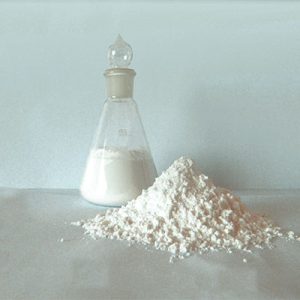Sodium Stannate
Specifications
| Item | Index |
| Appearance | White powder |
Packing& Storage
| Packing | In 25kg barrel | |||||||
| Storage | 20℃, 2 years. | |||||||
| Shipping | Room temperature in China; may vary elsewhere | |||||||
General Information
1.1 Chemical & Physical Properties
| Common Names | Sodium stannate | Sodium tin oxide | ||||||
| Structure |  |
||||||
| CAS No. | 12058-66-1 | Boiling Point (℃) | N/A | ||||
| Molecular Weight | 212.688 | Melting Point (℃) | 140°C | ||||
| Appearance | Colorless hexagonal plate-like crystals or white powder | Vapor Specific Gravity | N/A | ||||
| HS Code | 2841900090 | Flash Point (℃) | N/A | ||||
| Solubility | Soluble in water, insoluble in alcohol and acetone | Autoignition Temperature (℃) | N/A | ||||
1.2 Safety Information
| Safety Phrases | S26 | |
| RIDADR | ||
| WGK Germany | ||
| Packaging Group | ||
| Hazard Class | ||
| SYMPTOMS | PREVENTION | FIRST AID | |
| Inhalation | Cough. Sore throat. | Use local exhaust or breathing protection. | Fresh air, rest. |
| Skin | Redness. Burning sensation. Itching. | Protective gloves. | Remove contaminated clothes. Rinse and then wash skin with water and soap. |
| Eyes | Redness. Pain. | Wear safety goggles. | First rinse with plenty of water for several minutes (remove contact lenses if easily possible), then refer for medical attention. |
| Ingestion | Abdominal pain. Nausea. Vomiting. | Do not eat, drink, or smoke during work. Wash hands before eating. | Rinse mouth. Induce vomiting (ONLY IN CONSCIOUS PERSONS!). Refer for medical attention . |
1.3 Synthetic Route
The alkaline hydrolysis method melts the tin block and quenches it into tin flower by water, and then mixes with caustic soda and sodium nitrate, and the reaction temperature rises from 300 °C to 800 °C to generate sodium stannate, which is cooled and dissolved with water, and then added sodium sulfide and hydrogen peroxide purification to remove impurities, and after precipitation, it is filtered by evaporation, concentrated by evaporation, centrifuged, dried and crushed to obtain sodium stannate products.
The use of sodium stannate
It is mainly used for alkaline tin plating and copper plating in the electroplating industry and electroless plating of tin alloys, zinc-tin alloys, aluminum alloys, and other alloys. It is used as a fire retardant and weighting agent in the textile industry and as a mordant in the printing and dyeing industry. They are also used in glass, ceramics, and other industries.
